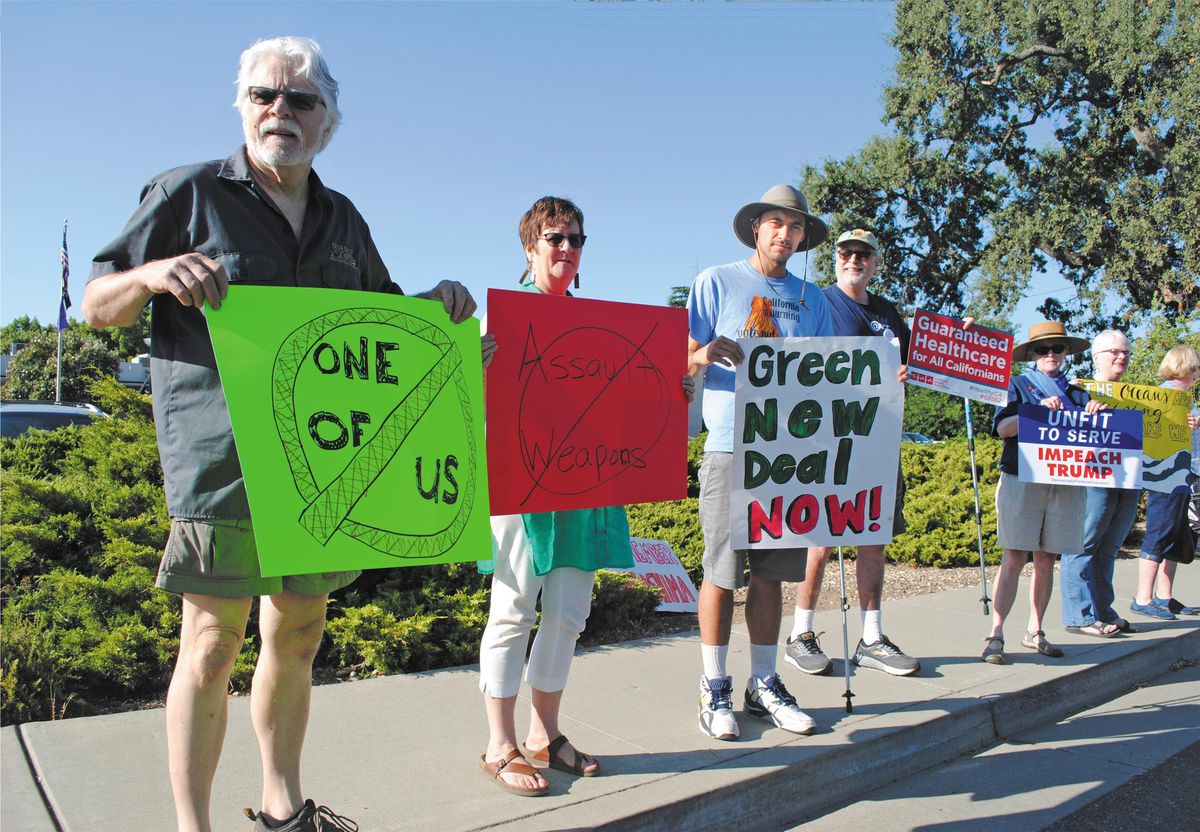
PHOTO BY ANDRE BYIK
Protesters on Monday (Aug. 12) line the entrance of the Chico Elks Lodge, where lawmakers held a meeting focused on Camp Fire recovery efforts.
Susan Dobra lost her home—and possessions collected during a lifetime of adventure—in the Camp Fire, she told lawmakers gathered for a wildfire recovery discussion on Monday (Aug. 12) at the Chico Elks Lodge.
Wearing a shirt emblazoned with the words “Green New Deal,” she said she plans to rebuild but urged Rep. Doug LaMalfa, Assemblyman James Gallagher and state Sen. Jim Nielsen to address the “climate crisis” at hand and support what portions they could of the Democrat-backed plan to battle climate change and economic inequality, lest Paradise burn again.
“The climate is changing, and this isn’t a partisan issue and it’s not theoretical,” Dobra said. “It burned down my town. It burned down my house.”
Several hundred other locals attended the event. There, lawmakers and state and federal officials provided updates on initiatives supporting the recovery and fielded complaints that home insurance policies have become unaffordable or unavailable in and around the fire zone (see “Insurance fallout,” Newslines, June 13). They also heard assertions like Dobra’s about a changing climate contributing to the fire risk in Butte County, a topic that drew animated discussion between lawmakers and the public.
Gallagher told Dobra he appreciated her comments and noted town officials have begun addressing smarter and safer ways to rebuild. He added, however, that he wanted to “set the facts straight” and lamented politicians who he said have called the Camp Fire a “climate disaster” to further their political goals.
“It’s not right,” Gallagher said. “It’s not true either. … The bottom line is: This was a spark that came from a PG&E line that probably should have been hardened. That’s one of the factors, and the most primary factor is the forestry management that has not been done for five decades now.”
Dobra, then mic-less, interjected, saying, “The science is clear,” but Gallagher continued, his voice amplified through the lodge.
The climate, he said, is a contributing factor, but not a primary one.
“If we care about climate, and we care about our carbon footprint, then we better get out in that forest and start doing something … because everything that we’ve done here in California just got extinguished by all these fires and all the carbon that went into the air after that fact,” Gallagher said. “So let’s be smart about our carbon and climate investments and strategy, not just do this kind of pie-in-the-sky Green New Deal stuff that doesn’t do a thing to address the underlying problems.”
Gallagher noted officials have been trying to secure another funding source to remove dead or dying trees on the Ridge, which he said has only been partially addressed so far. He added that PG&E should pay for part of the effort.
Gordon Gregory, a Paradise resident and small-business owner, also took to the mic at the meeting, saying he’d heard encouraging updates about the recovery effort but not much about confronting climate change.
“We know that we have built in dangerous places,” Gregory said. “We know we have to change the way we think about wildfire risk, but we also have to acknowledge that warming temperatures are driving a lot of problems that we’re facing today.”
Gregory pointed to a 2018 climate assessment released by President Trump’s administration, which found the “cumulative forest area burned by wildfires has greatly increased between 1984 and 2015, with analyses estimating that the area burned by wildfires across the Western United States over that period was twice what would have burned had climate change not occurred.” (Trump has dismissed portions of the report.)
“I would love to see you gentlemen acknowledge that that’s an issue,” Gregory said. “That we need to address it. That we can’t protect our communities without beginning to deal with our greenhouse gas emissions.”
LaMalfa said he would not address how or why temperatures are changing, “but certainly we can be proactive of whatever the effect of the weather is by forest management and water storage and some other measures.”
He added: “If, indeed, we’re not keeping snowpack, then we’d have to have more receptacles to hold water … and the same thing would apply to how many trees per acre is sustainable for the amount of groundwater or snowpack that is or isn’t there.”
Gregory told the CN&R that LaMalfa’s response was disappointing but expected. The congressman has said he does not believe humans are responsible for climate change, but Gregory said he did hear positive ideas for addressing the effects of a warming climate, if not the underlying issue.
LaMalfa, he said, may have a point regarding the number of trees per acre in high-fire-risk areas like Paradise and surrounding communities. And he agreed that a better job must be done to manage the forests in the Sierra Nevada.
But “when the town burns down, it’s not forest management,” Gregory said, adding that “fire in the West is one of the leading symptoms of climate change.”
